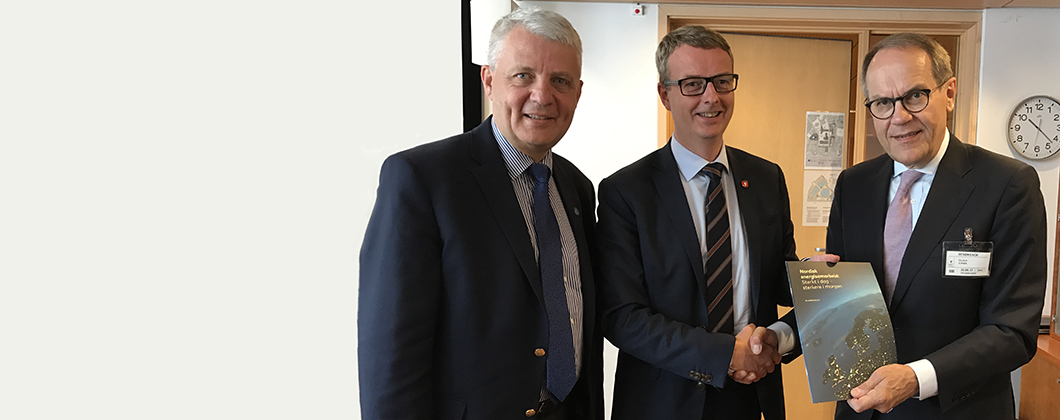“Closer co-operation on energy will keep the Nordic Region on top”
21st of June 2017

Competition in the field of green energy is getting fiercer at an unprecedented rate, and the Nordic countries need to work together to remain at the top,” says former Nokia CEO Jorma Ollila in his report outlining 14 proposals for closer Nordic energy co-operation. “The most important step is to formulate a new vision for the co-operation,” he adds.
The Nordic Council of Ministers commissioned Ollila to conduct a strategic review of how Nordic energy co-operation might develop over the next 5–10 years. On 20 June, he presented his report to the Norwegian Minister of Petroleum and Energy Terje Søviknes, chair of the Nordic Council of Ministers for Business, Energy and Regional Policy in 2017 and to Dagfinn Høybråten, the Secretary General of the Nordic Council of Ministers.
Download the energy report here
Ollila’s report Nordic Energy Co-operation Strong today – stronger tomorrow contains 14 proposals for closer collaboration. The report is based on the transition to green energy, the Paris climate agreement, trends in the energy sector in the EU and the national energy strategies in the Nordic Region.
“The level of ambition has to be high. We need to set a goal of developing the smartest energy system in the world and finding the most cost-effective solutions for the green transition.”
The greatest challenges lie ahead
One of the main messages in the report is that we have yet to contend with the most difficult challenges in the green transition, especially in the transport sector. “This makes it crucial that small countries work together to assert themselves in the face of global competition,” Ollila explains.
“The next decade will be particularly challenging. Major players are investing massive resources into the green transition, and competition is getting fiercer at an unprecedented rate. At the moment, the Nordic Region is a world leader, but the individual countries may prove to be too small to cope with the international competition. The question, then, is can we afford not to work together?”
New vision important
According to Ollila, an important first step towards meeting the challenges is to draw up a clear vision for Nordic energy co-operation.
“The level of ambition has to be high. We need to set a goal of developing the smartest energy system in the world and finding the most cost-effective solutions for the green transition.”
The rest of the proposals flow from this overarching vision. They include significantly greater investment in Nordic research and development, He proposes a special vision for Nordic Energy Research, a Nordic energy and innovation PhD programme.
and Nordic peer reviews of how national energy decisions affect the rest of the Region.
Ollila encourages the Nordic countries to maximise synergies, mentioning the unique and successful collaboration in the electricity market as a prime example.
“It is living proof of what open and trusting partnerships can achieve. The whole Region has benefited from the synergy effects and working together in a similar way would be good for the whole of the energy sector.”
The report also proposes concentrating on a market-based electricity market instead of other solutions and drawing up a Nordic export strategy for energy technology and solutions to be implemented by business associations and national export councils.
“Nordic energy co-operation is a success as things stand, especially in the electricity market, where it has a good international reputation,” he says.
Good basis for discussions
The report serves as input into the debate about the future of energy co-operation. Ultimately, the energy ministers and the Nordic governments will decide the shape of future co-operation.
“Nordic energy co-operation is a success as things stand, especially in the electricity market, where it has a good international reputation. I look forward to discussing the proposals in the report with my fellow ministers before decisions are taken about a new Nordic programme,” says Terje Søviknes.
The Council of Ministers’ introduced the concept of strategic studies as part of their reform project ’New Nordic Region’. Previous topics covered include health and the labour market.
“The purpose of the project is to make Nordic co-operation more efficient and more politically relevant and to try and identify areas where there is potential for new regional co-operation. The energy report is an important continuation of this work and an excellent summary of the challenges ahead. Several of Ollila’s proposals are worth considering, and not just in the energy sector,” says Dagfinn Høybråten, Secretary.
Footnote: In the process of drawing up the report, Jorma Ollila consulted a hundred politicians and other representatives from the energy industry and the public and private sectors, both in the Nordic Region and elsewhere in Europe.
Source: News from the Nordic Council of Ministers and Nordic Council on Nordic Co-operation
